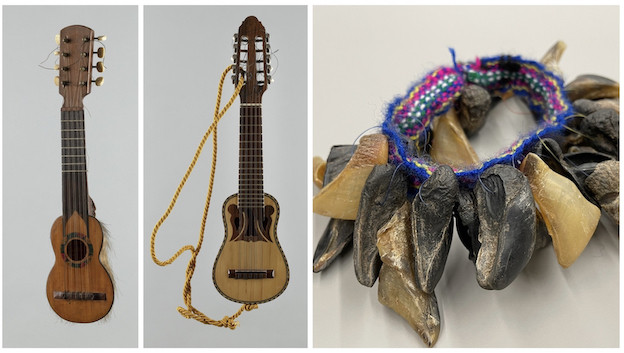
News
Chile in Barcelona: a tour of the Museu de la Música collections
On 31 March I had the honour of giving the inaugural lecture at the III Cátedra Hispanoamericana Oreste Plath 2022, organised by the Sociedad de Folclor Chileno and the Dirección de Extensión Cultural Artística of the Universidad de Talca, in Chile. I was invited by the president of the Society, Yvaín Eltit, and one of its most distinguished collaborators, Karen Plath Müller Turina, daughter of Oreste Plath, to whom I am enormously grateful for the invitation and the welcome extended. The presentation, carried out live on the University's YouTube channel and available online, was an opportunity to discover unknown relationships between the pieces in our museum and the trans-Andean country, and to disseminate our heritage activity among the Chilean public.
The relationship between the Chilean Folklore Society (formerly the Chilean Folklore Association) and our city is not new: one of its founders, Carlos Lavín, lived in Barcelona during his last years and his tomb is in the Montjuïc cemetery in Barcelona. Likewise, several members of this association, created in 1943, had contact with Catalan musicians such as Miquel Llobet in the first decades of the 20th century. One of them was the writer, editor and folklorist Oreste Plath, pseudonym of César Octavio Müller Leiva, who together with Carlos Lavín, María Luisa Sepúlveda, Pepita Turina, Remigio Acevedo and many others, worked for the study and recovery of Chilean traditional and popular manifestations.
Our collections contain some very representative pieces of the relationship with Chile in general and with the Chilean Folklore Association in particular. In the field of instruments, the Museu de la Música holds three instruments: an idiophone with the vernacular name of ch'ullus, built in 1980 with cloth and llama nails and donated to the museum, and two charangos (chordophones with bridge and neck) from the second half of the 20th century and loaned by the Catalan singer-songwriter Quico Pi de la Serra, that you can see in the header of this article.
The collection of objects and works of art includes a very special piece: a medal commemorating the laying of the first stone of the National Library in Santiago in 1913. The medal, which is small in size, is engraved on the obverse with a revealing image: a woman in classical dress, seated beside a wall and a column, reading a book. We also see volumes on the floor at her feet, together with a globe, and an inscription in Latin: 'VITA SINE LITTERIS MORS EST', i.e. life without letters is death. On the reverse we read: "BIBLIOTECA NACIONAL / COLOCACION DE LA / PRIMERA PIEDRA / PRESIDENTE DE LA REPUBLICA / EXMO. / RAMON BARROS LUCO / MINISTRO DE INSTRUCCION PUBLICA / SR. DN. FANOR PAREDES / SANTIAGO DE CHILE / 1913".
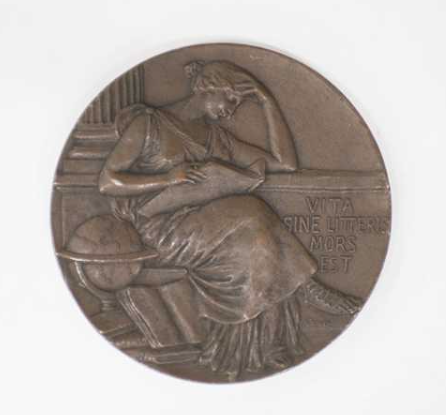
The origin of the medal is unclear, as it comes from a donation of four medals made in 1976 by Rosina Moya Albéniz, granddaughter of the Spanish composer Isaac Albéniz Pascual (1866-1909). Subsequently, Rosina Moya made several important donations of art objects, scores, documentation and the piano of her grandfather, one of the most important Spanish composers of the 19th and 20th centuries. In any case, the medal dates from after the death of Albéniz, who died in 1909, so it is a family legacy unrelated, a priori, to the musical activity of the composer from Girona.
The most prolific area in terms of relations between Chile and Barcelona is the Museum's Historical Archive. It comprises more than 20,000 documents in private collections, both from private individuals (musicians, conductors, composers, performers) and from entities linked to the musical life of Barcelona in particular and Catalonia in general during the 19th and 20th centuries. One of the most important collections is that of Miquel Llobet i Solés (1878-1938), guitarist, pupil of Francisco Tárrega and a great promoter of the guitar as a concert instrument. Miquel Llobet's personal collection contains more than 2,500 documents, with scores, concert programmes, correspondence, photographs, press cuttings and administrative documentation of all kinds. It is here that the Chilean presence is most evident and numerous, due to the successful tours that Llobet made in Chile in 1912, 1918 and 1922, of which an abundant trail of 57 documents remains.
The most important, and thanks to which the relationship between the Museu de la Música and the Sociedad de Folclor Chileno began, is this printed score:
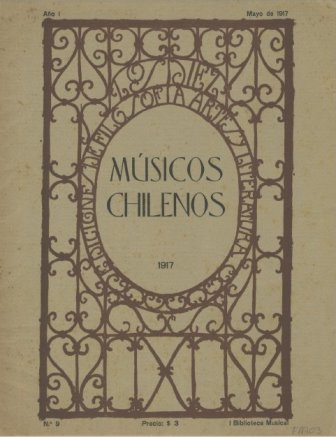
This is a compilation of musical works, entitled Músicos chilenos, published in Santiago in May 1917 by 'Ediciones de Los Diez' under the number 9. It is also numbered as the first volume of the sub-collection Biblioteca Musical, and was sold at a price of 3 dollars. It brings together eight compositions by Chilean composers, of which two are piano reductions of orchestral works and the rest are originals for piano. Here we find the cream of the Chilean cultural world of the early 20th century, such as María Luisa Sepúlveda, Carlos Lavín and Humberto Allende, who dedicated this copy to Miquel Llobet, who took the publication across the Atlantic to Barcelona: "To the world's first guitarist and great artist, Don M. Llobet. Your most affectionate friend". The dedication is dated 4 March 1918 in Santiago, that is to say, within the framework of the concert tour that Llobet made in Chile during this period.
Thanks to the postcards Llobet sent during his travels, as well as posters and concert programmes, we can easily trace the itineraries he followed. Thus, we have documentary traces of his passage through Santiago, Concepción and Valparaíso, and of his performances in important theatres such as Unión Central, Colón, La Bomba and Concepción. The press echoed the performances of the guitarist, to which articles and reviews refer in media such as El Chileno, El Diario ilustrado, La Música, La Unión, La Razón, El día de Valparaíso, Mercurio, La Mañana or the magazine Zigzag, considered to be the first miscellaneous magazine and the beginning of modern journalism in Chile.
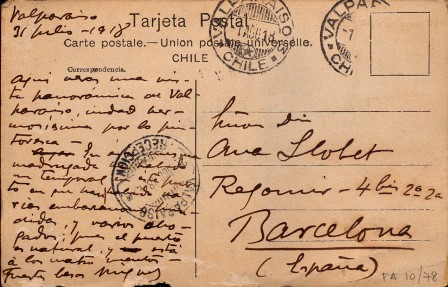
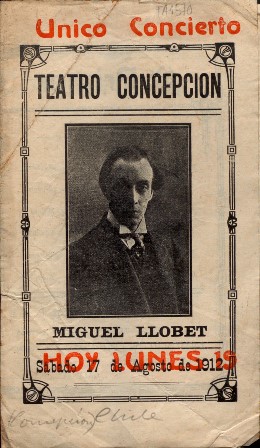
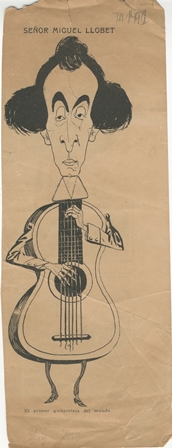
The Chilean imprint is also present in the sound collection of the Museu de la Música, with a recording of the songs Recuerdos chilenos / Guitarra mía by Imperio Argentina for Parlophon, released in 1932. The Museu's specialised library contains books and articles on Chilean instruments such as the nolkin or pilfica, on the cueca as a musical manifestation and on the Instituto de Extensión Musical and its work for the valorisation of the Chilean musical heritage.
From the Museu de la Música we would like to thank the kind welcome given by the Sociedad de Folclor Chileno, its president Yvaín Eltit, Karen Müller Turina and all those who participated in the opening of the III Cátedra Hispanoamericana Oreste Plath. We hope that this is only the beginning of many more collaborations.

